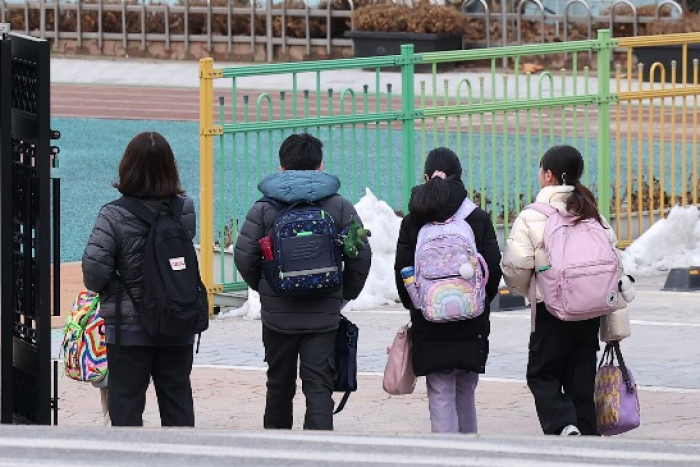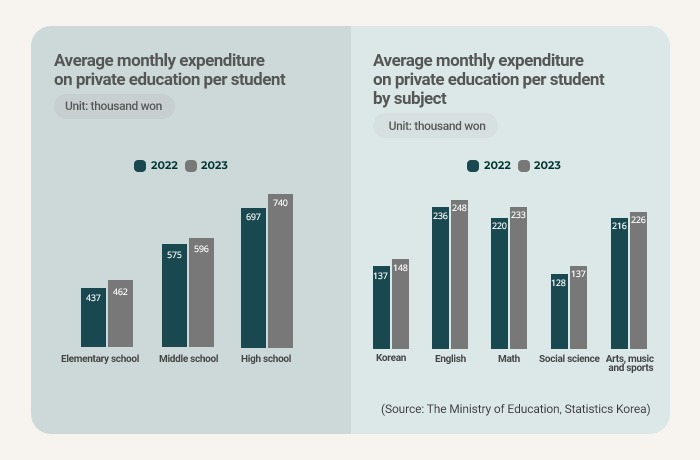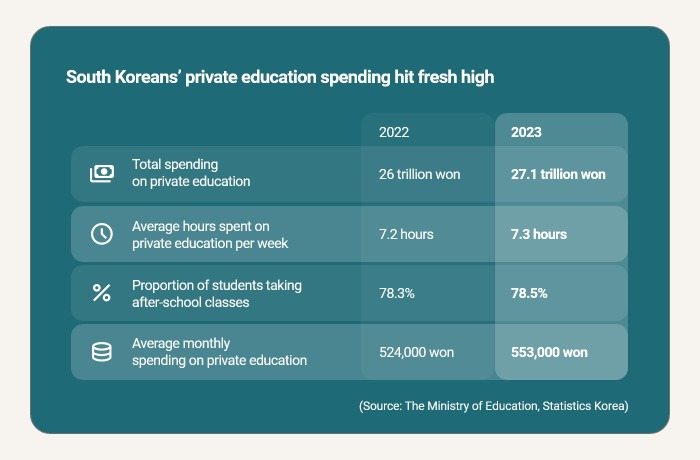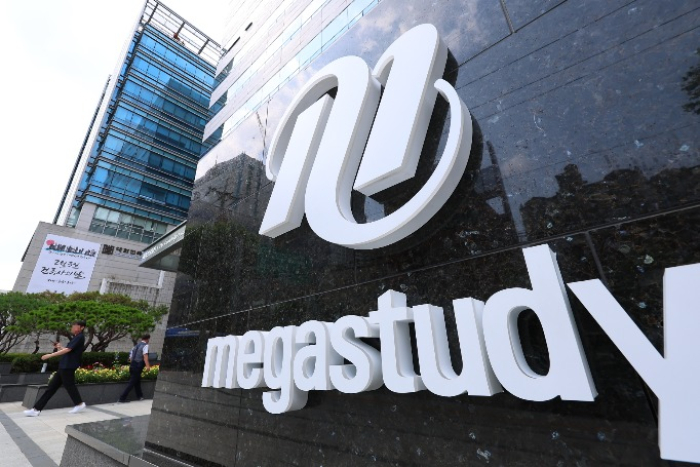Economy
Private education spending in S.Korea hits new record high
English tops the list of subjects on which Koreans spend the most for private learning
By Mar 15, 2024 (Gmt+09:00)
3
Min read
Most Read
LG Chem to sell water filter business to Glenwood PE for $692 million


KT&G eyes overseas M&A after rejecting activist fund's offer


Kyobo Life poised to buy Japan’s SBI Group-owned savings bank


StockX in merger talks with Naver’s online reseller Kream


Meritz backs half of ex-manager’s $210 mn hedge fund



South Koreans’ spending on private education hit a new record high of 27.1 trillion won ($20 billion) in 2023, as the government’s announcement to raise medical school and regular admission quotas prompted a frenzy of after-school classes.
Despite a drop in the number of elementary, middle and high school students, average expenditures on their private education rose 4.5% on-year in 2023, marking the fastest pace of annual growth in seven years, according to a survey by the Ministry of Education and Statistics Korea on Thursday.
Their total private education spending in 2023 set a new record high for a third consecutive year.
The number of students at elementary, middle and high schools shrank 1.3% on-year to 5.21 million in 2023 in the country grappling with the world’s lowest fertility rate.
High schoolers led the rise in after-school tutoring expenditures. Private education spending on the group jumped 8.2% on-year to 7.5 trillion won in 2023, recording the largest annual increase since the 8.7% gain in 2016.
By comparison, private education spending for elementary and middle school students added 4.3% and 1.0% to 12.4 trillion won and 7.2 trillion won, respectively, from a year before.


The government’s plan to raise the annual quota for medical school admission also boosted enrollment in private academia.
The average monthly expenditure on private education for each student spiked 5.8% to 434,000 won in 2023, the highest-ever spending in South Korea.
Among those taking private lessons, their monthly spending averaged 553,000 won. That means a household with two children poured more than 1 million won into after-school classes.
By subject, English topped the list with an average spending of 248,000 won a month. Match and Korean came next with 233,000 won and 148,000 won, respectively.
The survey found the higher the household income, the higher the expenditure on private education.
Households with an average monthly income of 8 million won or more spent 671,000 won on private education on average, 3.7 times that of households with an average monthly income of less than 3 million won.

Monthly private education spending in a dual-income household averaged 459,000 won per student, compared with 429,000 won and 288,000 won for a single-income family led by a father and mother, respectively.
The average private education expenditure per student for households with one child was 486,000 won a month, higher than 456,000 won for households with two children and 334,000 won for households with three or more children.
Such a hefty price tag on children's education is cited as one of the biggest obstacles for married couples in planning to have children
In a survey of 1,000 working women in Korea from Feb. 5 to 20, commissioned by The Korea Economic Daily, its respondents estimated that the average cost to raise a child for 19 years from birth is 252.1 million won, 16% higher than last year when a similar survey was conducted.
Write to Sang-Yong Park and Young-Yeon Kang at yourpencil@hankyung.com
Yeonhee Kim edited this article.
More to Read
-
 EconomyS.Korea’s fertility rate hits new world-record low in 2023
EconomyS.Korea’s fertility rate hits new world-record low in 2023Feb 28, 2024 (Gmt+09:00)
4 Min read -
 EconomySome 6 out of 10 working Korean women choose to be child-free
EconomySome 6 out of 10 working Korean women choose to be child-freeFeb 27, 2024 (Gmt+09:00)
4 Min read -
 Artificial intelligenceS.Korea's Riiid enters Brazilian public education market
Artificial intelligenceS.Korea's Riiid enters Brazilian public education marketJul 05, 2023 (Gmt+09:00)
1 Min read -
 Business & PoliticsYoon's English School, Thai Edupark to cooperate in local education market
Business & PoliticsYoon's English School, Thai Edupark to cooperate in local education marketApr 13, 2023 (Gmt+09:00)
1 Min read -
 Tech, Media & TelecomEducation giant Kyowon to showcase animated film 'Georanger'
Tech, Media & TelecomEducation giant Kyowon to showcase animated film 'Georanger'Nov 11, 2022 (Gmt+09:00)
1 Min read
Comment 0
LOG IN


